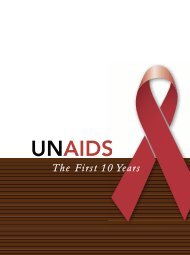Integration of HIV/AIDS activities with food and nutrition support in ...
Integration of HIV/AIDS activities with food and nutrition support in ...
Integration of HIV/AIDS activities with food and nutrition support in ...
Create successful ePaper yourself
Turn your PDF publications into a flip-book with our unique Google optimized e-Paper software.
expected to provide their services for free until the situation stabilizes, which can be difficult<br />
when they too are struggl<strong>in</strong>g to feed their families. Second, provision <strong>of</strong> health-related services<br />
may be hampered by the provider’s need to devote time to <strong>activities</strong> that earn <strong>food</strong> or <strong>in</strong>come.<br />
Third, the need for volunteers to address <strong>HIV</strong>/<strong>AIDS</strong> <strong>in</strong> refugee communities is new, <strong>and</strong> many<br />
such communities do not have people do<strong>in</strong>g <strong>HIV</strong>/<strong>AIDS</strong>-related work. Agencies must build the<br />
capacity <strong>of</strong> community groups – <strong>of</strong>ten young people – to conduct <strong>AIDS</strong> prevention <strong>activities</strong>,<br />
<strong>and</strong> may need to provide temporary <strong>in</strong>centives to these people until the community itself underst<strong>and</strong>s<br />
the importance <strong>of</strong> the activity <strong>and</strong> is able <strong>and</strong> will<strong>in</strong>g to <strong>support</strong> it f<strong>in</strong>ancially.<br />
Food <strong>and</strong> related resources may be used as an <strong>in</strong>centive to <strong>support</strong> <strong>HIV</strong>/<strong>AIDS</strong> prevention efforts<br />
<strong>in</strong> two ma<strong>in</strong> ways:<br />
Strategy 19 Support to community health volunteers engaged <strong>in</strong> <strong>HIV</strong>/<strong>AIDS</strong> prevention <strong>activities</strong> or <strong>in</strong> car<strong>in</strong>g for<br />
PLWHA <strong>and</strong> <strong>HIV</strong>/<strong>AIDS</strong>-affected families<br />
Strategy 20 Support to community awareness <strong>and</strong> mobilization <strong>activities</strong> <strong>of</strong> PLWHA by provid<strong>in</strong>g <strong>food</strong> for events<br />
The exact form that the <strong>in</strong>centive should take depends on the local context. The <strong>in</strong>centive<br />
selected should be valuable to the <strong>in</strong>dividuals be<strong>in</strong>g rewarded. Where access to <strong>food</strong> is limited,<br />
health volunteers may be happy to receive <strong>food</strong>. However, where access to <strong>food</strong> is adequate,<br />
because a full ration is distributed to the entire population, or because economic <strong>activities</strong> are<br />
well established, other <strong>in</strong>centives may be preferable. These could <strong>in</strong>clude eligibility for <strong>in</strong>comegenerat<strong>in</strong>g<br />
projects, agricultural projects, microcredit projects, community bank<strong>in</strong>g <strong>and</strong> animal<br />
rotation schemes. Groups to target <strong>in</strong>clude community volunteers <strong>and</strong> PLWHA engaged <strong>in</strong><br />
<strong>HIV</strong>/<strong>AIDS</strong> prevention. Where resources allow, it is also possible to provide <strong>food</strong> to all participants<br />
<strong>in</strong> <strong>HIV</strong>/<strong>AIDS</strong> prevention <strong>activities</strong> as a way to promote community participation. Food<br />
should not be perceived as an alternative to cash payment <strong>of</strong> health workers where appropriate<br />
budgets exist.<br />
Provision <strong>of</strong> <strong>in</strong>centives is a short-term <strong>in</strong>tervention designed to allow vital health care to be<br />
delivered <strong>in</strong> the community. Just as <strong>in</strong>centives reward <strong>and</strong> motivate health volunteers engaged<br />
<strong>in</strong> <strong>HIV</strong>/<strong>AIDS</strong> prevention (e.g., peer educators, condom distributors), they can acknowledge<br />
the valuable efforts <strong>of</strong> community health volunteers who provide health, <strong>nutrition</strong>al or psychosocial<br />
<strong>support</strong> to PLWHA. In all cases, developmental <strong>activities</strong> are preferable to short-term<br />
humanitarian assistance, <strong>and</strong> external <strong>in</strong>centives should be phased out <strong>with</strong> the establishment<br />
<strong>of</strong> community <strong>support</strong> mechanisms.<br />
Agency staff should work <strong>with</strong> participants to identify appropriate <strong>in</strong>centives, be<strong>in</strong>g m<strong>in</strong>dful<br />
not to underm<strong>in</strong>e long-term commitment to the work, <strong>and</strong> to consider livelihood-based <strong>in</strong>centives<br />
where possible <strong>and</strong> appropriate.<br />
90

















